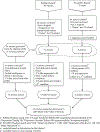Depression in Turner Syndrome: A Systematic Review
- PMID: 31598804
- PMCID: PMC7035188
- DOI: 10.1007/s10508-019-01549-1
Depression in Turner Syndrome: A Systematic Review
Abstract
Turner syndrome (TS) is a genetic condition characterized by partial or complete monosomy X. Alterations in hormonal function, height, and peer relationships, among other features and correlates of TS, appear to be risks for depressive illness. In order to summarize what is known about depression in Turner syndrome, with the aim of determining whether individuals with TS are at increased risk for depression, a literature search and analysis were conducted. In total, 69 studies were identified and 35 met criteria of being peer-reviewed English language articles that collected original data on the experience of depression in individuals with TS. Most studies used patient or parent questionnaires to evaluate depressive symptoms. These studies, a majority of which examined adults and half that examined adolescents, found that individuals with TS experienced more frequent and severe depressive symptoms than individuals without TS diagnoses. Articles studying children with TS did not demonstrate a difference in their depressive experience compared to individuals without TS. Three articles used clinician-administered scales, such as the Structured Clinical Interview for DSM-IV; all diagnosed depression in those with TS at higher rates than others. Five studies relied on expert opinion to evaluate depression. The remaining eight articles were case reports or case series that relied on expert opinion. From these data, we conclude that adolescents and adults with TS are at risk for depression and adulthood appears to be the period of the highest risk. Studies in the last 12 years show consistently more severe depressive symptoms in individuals with TS than in previous years. Implications, risk factors, and recommendations for future research are discussed.
Keywords: Depression; Disorders of sex development (DSD); Mental health; Turner syndrome.
Conflict of interest statement
Conflict of Interest: The authors declare that they have no conflict of interest.
Figures
References
Appendix of excluded dissertation
-
- Diamond DC, (2004). Depression and quality of life in women with Turner’s syndrome (Doctoral dissertation). Available from ProQuest Dissertations Publishing. (3184214)
Appendix of excluded non-English articles
-
- Cristodorescu D, & Alexandru S (1968). [Pure gonadal dysgenesis from the psychiatric viewpoint]. Neurologia, Psihiatria, Neurochirurgia, 13, 125–130. - PubMed
-
- Romani JD, Lôo H, Reyes F, Lôo P, Saba S, & Parry J (1967). [On a case of Turner’s syndrome]. Annales Medico-Psychologiques, 125, 102–105. - PubMed
-
- Skałba P, Jez W, & Kabzińska M (2002). [Anorexia nervosa in woman with Turner’s syndrome]. Ginekologia Polska, 73, 540–542. - PubMed
-
- Toublanc JE, Thibaud F, & Lecointre C (1997). [Psychosocial and sexual outcome in women with Turner syndrome]. Contraception, Fertilite, Sexualite, 25, 633–638. - PubMed
References
-
- Abir R, Fisch B, Nahum R, Orvieto R, Nitke S, & Ben Rafael Z (2001). Turner’s syndrome and fertility: Current status and possible putative prospects. Human Reproduction Update, 7, 603–610. - PubMed
-
- Al-Asadi AM, Klein B, & Meyer D (2015). Multiple comorbidities of 21 psychological disorders and relationships with psychosocial variables: A study of the online assessment and diagnostic system within a web-based population. Journal of Medical Internet Research, 17, e55 10.2196/jmir.4143 - DOI - PMC - PubMed
-
- Bender BG, Harmon RJ, Linden MG, & Robinson A (1995). Psychosocial adaptation of 39 adolescents with sex chromosome abnormalities. Pediatrics, 96, 302–308. - PubMed
Publication types
MeSH terms
Grants and funding
LinkOut - more resources
Full Text Sources
Medical
Miscellaneous



